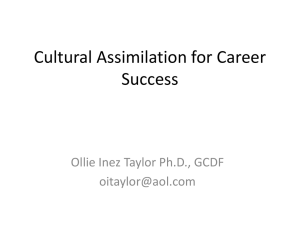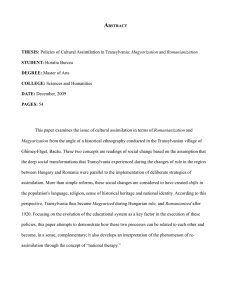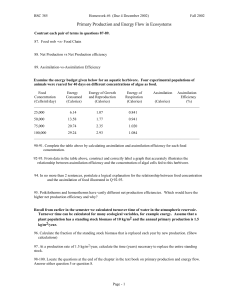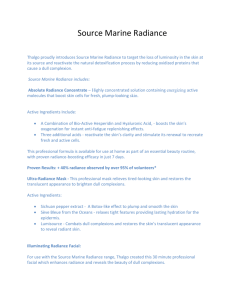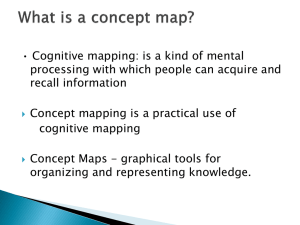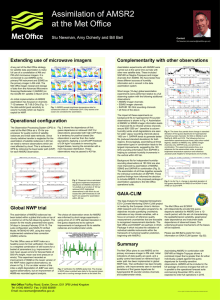Recent activities on microwave radiance data assimilation at JMA Masahiro Kazumori
advertisement
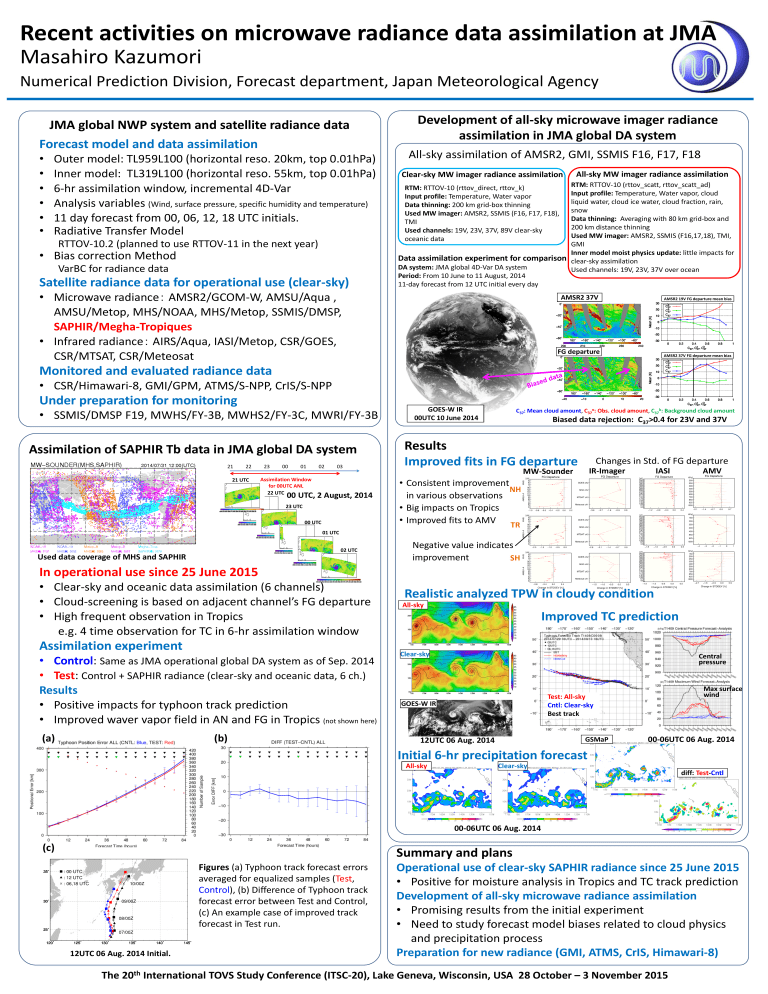
Recent activities on microwave radiance data assimilation at JMA Masahiro Kazumori Numerical Prediction Division, Forecast department, Japan Meteorological Agency JMA global NWP system and satellite radiance data Forecast model and data assimilation • • • • • • Outer model: TL959L100 (horizontal reso. 20km, top 0.01hPa) Inner model: TL319L100 (horizontal reso. 55km, top 0.01hPa) 6-hr assimilation window, incremental 4D-Var Analysis variables (Wind, surface pressure, specific humidity and temperature) 11 day forecast from 00, 06, 12, 18 UTC initials. Radiative Transfer Model RTTOV-10.2 (planned to use RTTOV-11 in the next year) • Bias correction Method VarBC for radiance data Satellite radiance data for operational use (clear-sky) Development of all-sky microwave imager radiance assimilation in JMA global DA system All-sky assimilation of AMSR2, GMI, SSMIS F16, F17, F18 Clear-sky MW imager radiance assimilation All-sky MW imager radiance assimilation RTM: RTTOV-10 (rttov_scatt, rttov_scatt_ad) Input profile: Temperature, Water vapor, cloud liquid water, cloud ice water, cloud fraction, rain, snow Data thinning: Averaging with 80 km grid-box and 200 km distance thinning Used MW imager: AMSR2, SSMIS (F16,17,18), TMI, GMI Inner model moist physics update: little impacts for Data assimilation experiment for comparison clear-sky assimilation DA system: JMA global 4D-Var DA system Used channels: 19V, 23V, 37V over ocean Period: From 10 June to 11 August, 2014 11-day forecast from 12 UTC initial every day RTM: RTTOV-10 (rttov_direct, rttov_k) Input profile: Temperature, Water vapor Data thinning: 200 km grid-box thinning Used MW imager: AMSR2, SSMIS (F16, F17, F18), TMI Used channels: 19V, 23V, 37V, 89V clear-sky oceanic data • Microwave radiance: AMSR2/GCOM-W, AMSU/Aqua , AMSU/Metop, MHS/NOAA, MHS/Metop, SSMIS/DMSP, SAPHIR/Megha-Tropiques • Infrared radiance: AIRS/Aqua, IASI/Metop, CSR/GOES, CSR/MTSAT, CSR/Meteosat AMSR2 37V AMSR2 19V FG departure mean bias FG departure AMSR2 37V FG departure mean bias Monitored and evaluated radiance data • CSR/Himawari-8, GMI/GPM, ATMS/S-NPP, CrIS/S-NPP Under preparation for monitoring • SSMIS/DMSP F19, MWHS/FY-3B, MWHS2/FY-3C, MWRI/FY-3B Assimilation of SAPHIR Tb data in JMA global DA system 21 22 21 UTC 23 00 01 02 03 Assimilation Window for 00UTC ANL 22 UTC 00 UTC, 2 August, 2014 23 UTC 00 UTC GOES-W IR 00UTC 10 June 2014 C37: Mean cloud amount, C37o: Obs. cloud amount, C37b: Background cloud amount Biased data rejection: C37>0.4 for 23V and 37V Results Improved fits in FG departure Changes in Std. of FG departure IR-Imager MW-Sounder IASI AMV • Consistent improvement NH in various observations • Big impacts on Tropics • Improved fits to AMV TR 01 UTC 02 UTC Used data coverage of MHS and SAPHIR Negative value indicates improvement SH In operational use since 25 June 2015 • Clear-sky and oceanic data assimilation (6 channels) • Cloud-screening is based on adjacent channel’s FG departure • High frequent observation in Tropics e.g. 4 time observation for TC in 6-hr assimilation window Assimilation experiment • Control: Same as JMA operational global DA system as of Sep. 2014 • Test: Control + SAPHIR radiance (clear-sky and oceanic data, 6 ch.) Results • Positive impacts for typhoon track prediction • Improved waver vapor field in AN and FG in Tropics (not shown here) (a) (b) Realistic analyzed TPW in cloudy condition All-sky Improved TC prediction Clear-sky Central pressure Max surface wind Test: All-sky Cntl: Clear-sky Best track GOES-W IR GSMaP 12UTC 06 Aug. 2014 00-06UTC 06 Aug. 2014 Initial 6-hr precipitation forecast All-sky Clear-sky diff: Test-Cntl 00-06UTC 06 Aug. 2014 (c) Summary and plans Figures (a) Typhoon track forecast errors averaged for equalized samples (Test, Control), (b) Difference of Typhoon track forecast error between Test and Control, (c) An example case of improved track forecast in Test run. 12UTC 06 Aug. 2014 Initial. Operational use of clear-sky SAPHIR radiance since 25 June 2015 • Positive for moisture analysis in Tropics and TC track prediction Development of all-sky microwave radiance assimilation • Promising results from the initial experiment • Need to study forecast model biases related to cloud physics and precipitation process Preparation for new radiance (GMI, ATMS, CrIS, Himawari-8) The 20th International TOVS Study Conference (ITSC-20), Lake Geneva, Wisconsin, USA 28 October – 3 November 2015
